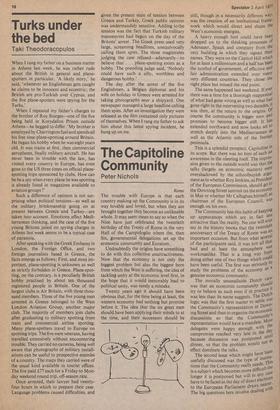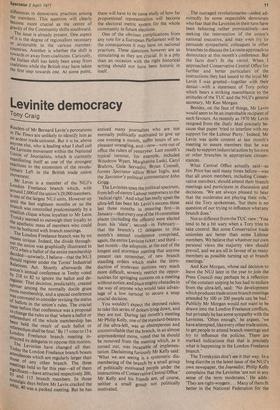The Capitoline Community
Peter Nichols
Rome The trouble with Europe is that each country making up the Community is in its way lovable and loved, but when they are brought together they become an unlikeable whole. It may seem mean to say so when the Nine have just celebrated the twentieth birthday of the Treaty of Rome in the very Hall of the Campidoglio where the, then Six, governmental delegations set up the economic community and Euratom.
Undoubtedly the origins have something to do with this collective unattractiveness. Now that the economy is not only the biggest problem but also the biggest bore from which the West is suffering, the idea of tackling unity at the economic level first, in the hope that it would inexorably lead to political unity, was surely a mistake.
Twenty years ago it should have been obvious that, for the time being at least, the western economy had nothing but promise before it. The idea that the six great men should have been applying their minds to at the time, and their successors should be
still, though in a necessarily different way, was the creation of an institutional framework which would direct and shape the West's economic energies.
A heavy enough hint could have been dropped on to the thinking processes of Adenauer, Spaak and company from the very building in which they signed their names. They were on the Capitol Hill which for at least a millennium and a half has been the symbol of government, of effective and fair administration extended over manY very different countries. They chose the right place but missed the real point.
The same happened last weekend. If ever there was a time for a thorough reappraisal of what had gone wrong as well as what had gone right in the intervening two decades, it was then, at the return to the origins. Of course the community is bigger now and promises to become bigger still. It has extended northward and now looks set t° stretch deeply into the Mediterranean as well as the Atlantic side of the Iberian peninsula. This is a splendid prospect, Capitoline in its scope. But there was no hint of such an awareness in the Meeting itself. The imPres' sion given to the outside world was that the talks (largely on economic matters) were overshadowed by the schoolboyish argament as to whether Roy Jenkins, as President • of the European Commission, should go to the Downing Street summit on the econolnY in May or whether Mr Callaghan himself, as chairman of the European Council, was enough on his own. The Community has this habit of keeping up appearances which are in fact less attractive than the reality. No one will ever say in the history books that the tvventieth anniversary of the Treaty of Rome was al: important occasion. But from what several of the participants said, it was not all that bad and at least the atmosphere was workmanlike. That is a long way fr0,111., doing either one of two things which coulu have been useful. The first was seriouslY t° study the problems of the economy as 3 genuine economic community. The morally unassailable Dutch' view, was that an economic community shoulnt try to behave as such even if in practice was less than its name suggests. The Di* logic was that the first matter to settle was the Community's representation at Down,ing Street and then to organise the econornt,e discussions so that the CommunitY st representation would have a mandate. Ivi°,s_ delegates were happy enough with compromise reached very late in the daty, because discussion was postponed LI dinner, so that the problem would not In
effect dominate the talks. been
The second issue which might have usefully discussed was the type of instit,u,: tions that the Community really needs.iTt tn; is a subject which becomes more diffieu s_ longer it is postponed but will in anY aen_ have to be faced as the day of direct elecnore to the European Parliament draws nea /1 The big questions here involve dealing WL1
differences in democratic practices among the members. This question will clearly become more crucial as the centre of gravity of the Community shifts southward. The issue is already present. One aspect of it is the degree of regionalism necessary or acceptable in the various membercountries. Another is whether the shift is towards or away from coalitions. Curiously, the Italian shift has lately been away from coalitions while the British may have taken the first step towards one. At some point, there will have to be some study of how far proportional representation will become the electoral metric system for the whole community in future elections.
One of the obvious complications from any vote for a European Parliament will be the consequences it may have on national practices. These questions however are as stimulating as they are crucial. It is a pity than an occasion with the right historical setting should not have been historic in itself.







































 Previous page
Previous page